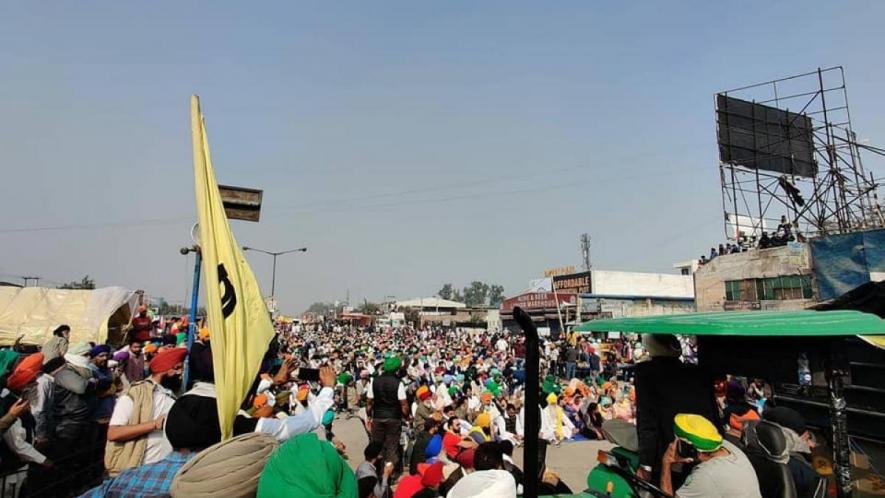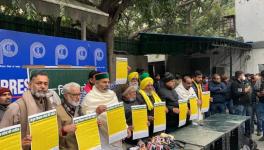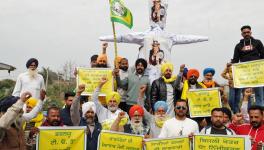Dispute Simmers Between Govt and Farmers in Haryana

File Photo
New Delhi: Twenty-five farmers, including women, were released by the Haryana Police on Thursday, June 3, after being detained for protesting at the residence of Tohana MLA Devender Singh Babli. Two of the farmer activists – Vikash Sisar and Ravi Azad – were sent to judicial custody after a local court remanded them.
Meanwhile, MLA Babli has been accused of harassing and hitting a farmer on his private parts during a protest, following which, the farmers have demanded an apology or an FIR for attempt to murder against the legislator.
Further, national president of Bharatiya Kisan Union, Gurnam Singh Chaduni has threatened to gherao all police stations in the state on June 7 if their demands are not fulfilled.
Hours after the farmers’ release, BKU leader Rakesh Tikait on Thursday accused the Central government of trying to shift the ongoing farmers’ agitation from the borders of Delhi to Haryana. The statement comes in the backdrop of the simmering dispute between the government and the farmers over the withdrawal of the three farm laws.
A few districts in Haryana including Hisar, Fatehabad and Jind have emerged as the hotspots of the farmers’ movement after a series of direct confrontations between disgruntled farmers and police over the visit of Bharatiya Janata Party-Jannayak Janata Party leaders. Farmers’ outfits had announced that all legislators including the BJP, the JJP and the independents who didn’t support the farmers’ movement would be boycotted and won’t be allowed entry into villages across the state.
Provoking Farmers
The latest conflict between farmers and the state police and government is being seen by many as an attempt to weaken the farmers’ movement. Farmers are also questioning why BJP-JJP politicians are visiting villages despite the boycott calls. Political experts believe that the government wants the friction and conflict to erupt between the farmers and the leaders which will be further utilised to build a narrative that the farmers’ movement is violent.
According to sources within the farmers, the government is devising the Jatt Aandolan strategy by provoking the protesters while also dividing the farmers and non-farmers’ communities. However, in the face of repeated provocations, the farmer leaders are treading carefully.
Also read: What the Dhand Anaj Mandi Tells us about Farm Laws and their Implications
It was exemplified in Chaduni’s remark when he referred the group of young farmers, who had gone to protest in front of JJP MLA Babli’s residence, as “rebels”. “They are those who want to become heroes. They are violating our decisions which were taken unanimously for further course of action. They went to the residence of the MLA and got arrested,” Chaduni had said.
The statement by Chaduni was met with opposition from the members of Samyukt Kisan Morcha (SKM), notably Rakesh Tikait who claimed that “the young farmers are their kids” who should be counselled.
“The statement by Chaduni came from a place where there is immense pressure by the government to prove that the farmers’ movement is violent. As much as we understand it, we can’t disown our fellow protesters. They were peacefully protesting and the arrest was uncalled for,” said Inderjeet Singh, vice-president of All India Kisan Sabha, Haryana.
The statement by Tikait is also seen as his attempt to make inroads inside Haryana. “Chaduni has a following in Haryana. But Tikait is being compared to Yashpal Malik – a jat leader who came from Uttar Pradesh to Haryana,” said a local journalist who has been following the movement closely.
Flashpoints
While Haryana government has maintained that they have no problem with the peaceful protesters, its actions have often demonstrated otherwise. While the Jannayak Janata Party (JJP) – with a sizeable farmer base – is attempting to take a moderate stance towards the farmers, the hostility displayed by the alliance has disappointed them.
Recently, thousands of farmers had staged a massive protest against the Hisar Police for lodging FIR against 350 farmers, alleging rioting, attempt to murder and unlawful gathering and spreading of COVID-19.
The charges were against the farmers who had obstructed the inauguration ceremony of a temporary COVID-19 hospital by CM Manohar Lal Khattar which subsequently evolved into a clash between police and the demonstrators.
“The COVID-19 hospital that CM had come to inaugurate was a school turned into a COVID-19 facility. Is it necessary for the CM to open a temporary facility in the midst of the pandemic? Why was it carried out? It is obvious to everyone. They knew there will be backlash from the farmers,” said Inderjeet.
Also read: Farm Laws: Protesters Face Brute Police Force in Hisar, Released Later
The charges were later withdrawn, which the farmers viewed as a “major victory”.
This is not the first time that the government has taken a hostile position against the farmers, but has maintained it throughout the farmers’ protest. It had started in November last year when farmers from Punjab were blocked at Haryana borders to stop them from reaching Delhi. At Ambala district, water cannons and tear gas were lobbed to disperse the farmers by the Haryana government.
The huge turnout of the farmers in Haryana had surprised the BJP government which had not expected large-scale mobilisation. BKU leader Chaduni had said then, “Haryana ke log jagte bahut der se hai, lekin jab jagte hain to sote use bhi zyada daer se hai (People of Haryana wake up late, but once they do, they go back to sleep even later.)”
When it became clear that the participation of Haryana farmers was not merely symbolic, the BJP-JJP government, was put under tremendous pressure. Several mahapanchayats were organised against the three controversial farm laws which were seen as major “crowd-pullers” with lakhs of participation.
“The government has been trying to establish that the farmers’ protests were politically motivated by the Opposition against the BJP. But this, too, is not working out for them,” said Inderjeet. Another clash had taken place between the police and the farmers in April this year, after the farmers protested against CM Khattar’s visit to Rohtak as a part of their boycott call. A protester and a police personnel were injured during the clash.
“Many divisive statements have been given by the government to control the farmers’ protest. When everything has failed, the government is trying one strategy after another to instigate the farmers,” said Kuldeep, a local journalist.
Meanwhile, the farmers are resolute in their opposition to the three contentious farm laws. “My brother and I are small land holding farmers. If we lose our lands where will we go? Hum bookhe mar jaaye? Humare survival ki ladai hai jo hum shantipurvak ladenge (Should we starve to death? This is a battle for our survival and we will continue to wage this peacefully). We will stop protesting once the government repeals these laws. It is as simple as that,” said Jitendar Singh, one of the protesting farmers from Haryana.
Also read: Farm Laws: Punjab and Haryana Gear up to Observe 'Black Day' on May 26
Get the latest reports & analysis with people's perspective on Protests, movements & deep analytical videos, discussions of the current affairs in your Telegram app. Subscribe to NewsClick's Telegram channel & get Real-Time updates on stories, as they get published on our website.
























